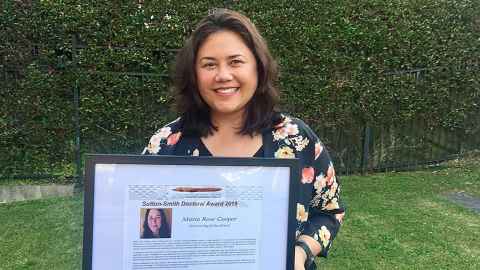New study rethinks leadership in early childhood education
03 December 2019
An exciting new form of leadership making a positive difference for children and families in early childhood education is at the centre of a ground-breaking PhD study from the University of Auckland.

Less about individual leaders and more about the collective leadership work happening within teaching teams, the study earned Dr Maria Cooper from the University’s Faculty of Education and Social Work the prestigious NZARE Sutton-Smith Doctoral Award for her thesis.
Dr Cooper believes her findings contribute exciting new knowledge to existing literature on leadership in this area.
“I conceptualised this idea as ‘everyday collective leadership’ to describe a team’s intentional, sustained and goal-driven activity aimed at strengthening teaching and learning,” she says. "This type of leadership draws on the expertise, knowledge and agency of all those involved."
Dr Cooper spent five months observing the interactions of two infant-toddler teaching teams within one high-quality early childhood centre in Auckland. She observed during their busiest times (i.e., children’s mealtimes) and during team meetings to look at ways staff interacted, shared knowledge and expertise, and how they participated in talk focused on strengthening teaching and learning.
She then undertook focus groups with each teaching team to discover their views on collaboration and leadership, followed by in-depth interviews with each of the 16 teachers, five of whom had formal leadership positions, as well as 10 parents for their perspectives on how this had worked for their children.
Her study also showed that the values of the centre were vital to establishing a culture of collective leadership within each team.

”The centre leaders espoused core values – congeniality and collegiality, relational trust, whanaungatanga and manaakitanga, and the empowerment of teachers – which were focused on bringing people together.”
She says the apparent enactment of these values in practice helped to foster an environment that was supportive of both teachers’ leadership development and positive outcomes for children and their families.
Dr Cooper hopes her research will encourage teachers and formal leaders to rethink how leadership might be understood, enacted, and developed in team-based settings. “The dominant one-size-fits-all model of ‘the leader’ has steered us away from understanding how collective expertise, knowledge and agency might be mobilised to move an educational community forward."
Her focus on teachers’ collective activity has revealed a powerful and inclusive form of leadership that wasn’t apparent in the literature and it now remains for centres to be open to a change in thinking.
“For others to embrace this new knowledge, they need to be open to possibilities of leadership that sits apart from, but also alongside, the individualistic framing which, in my view, has dominated leadership thinking in the sector for too long.”
This type of leadership draws on the expertise, knowledge and agency of all those involved.
Her research sends a strong message to others that leadership is not one thing, but more likely to be a graduated continuum of varying practices, where an individual position of authority sits on one end, and an expansive view of leadership as an inclusive, multi-dimensional activity sits on the other.
“Other variations of these fall somewhere in between. Viewing leadership as a continuum might then help to bring more focus to the complex and nuanced forms of leadership that are, and can be, enacted within diverse early childhood contexts," she says.
Drawing on her own Samoan heritage, cultural knowledge and an appreciation for the bicultural early childhood curriculum framework, Te Whāriki, she plans to extend her exploration of everyday collective leadership within early childhood contexts that have a strong cultural orientation, like Māori and Pacific.
Dr Cooper not only received the NZARE Sutton-Smith Doctoral Award for an excellent doctoral dissertation with implications for practice, policy and teacher leadership, but in 2013 also won the NZARE Rae Munro award for an excellent masters thesis with implications for teaching practice and teacher education.
She believes she is the first person to receive both awards. Her PhD supervisors in the Faculty were Professor Helen Hedges and Dr Deidre Le Fevre.
Media contact
Julianne Evans | Media adviser
Mob: 027 562 5868
Email: julianne.evans@auckland.ac.nz